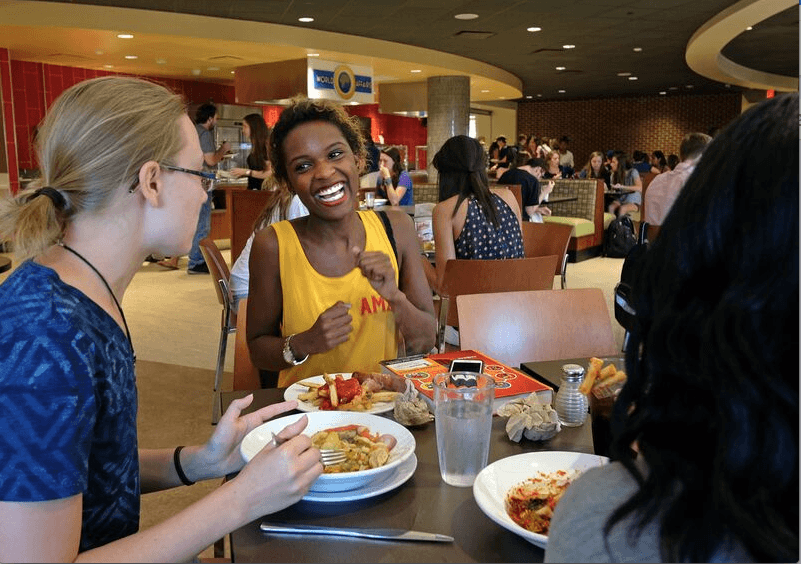UMW Dining Services and Student Senate meet to discuss dining hours
3 min read
University Relations
By EMILY HOLLINGSWORTH
Leaders from UMW Dining Services met with the Student Senate on Wednesday at 4:30 p.m. in the first floor lecture room of Monroe Hall to receive feedback and provide additional information regarding the recent changes in University Dining.
Students’ main concerns have been those regarding University Dining’s hours of operation. An extension of the dining hours occurred with three of UMW’s dining options on campus beginning Sept. 14 and continued through Monday of this week.
Roy Platt, general manager of Sodexo in UMW Dining Services, Rick Pearce, vice president for administration and finance and Juliette Landphair, vice president for Student Affairs, attended the meeting and listened to feedback from members of the student senate.
The UMW dining hall restaurants “Simple Servings” and the “Sustenance” salad bar will be open until 9 p.m. on Mondays through Thursdays. The changes were enacted on Monday of this week.
Beginning on Friday evenings, “Simple Servings” and “Sustenance” will close at 7 p.m.
“Blackstone Coffee,” the retail restaurant located across from the Information and Technology Convergence Center will remain open until 11 p.m. on Mondays through Thursdays and close at 9 p.m. on the weekends.
The extensions, according to Landphair, are meant to address concerns from students about operational hours.
“We were hearing a lot of feedback that students with later afternoon/early evening obligations were having a hard time getting to the dining center in time,” Landphair said through an email message.
According to Landphair, “Simple Servings” and the “Sustenance” salad bar provides proper dining options for students who would previously be unable to dine at earlier hours.
“Simple Servings and Sustenance were chosen because they best meet the needs of the students and the responsibilities of the dining center staff who need to clean up and begin preparing for the next day,” Landphair said.
During the meeting, students brought up concerns such as the viability of gluten-free options on campus, such as gluten-free pasta or including gluten-free sauces.
Members of the student senate also believed creating posters of the vegan, vegetarian and gluten free options on campus and spreading them around campus would bring greater awareness of the options available rather than solely keeping the information online.
According to Platt, a full menu of the dining options in the University Center is located on UMW Dining’s website, umw.sodexomyway.com.
The menu, however, is not easy to find.
Elizabeth Hiatt, sophomore and political science and sociology major, is a vegetarian and used the online menu when she went to Seacobeck Hall for dining last semester. However, she has not been able to locate the menu since last semester.
According to Hiatt, the online menu could be a valuable option for vegetarians or vegans who need the resource before heading to the dining hall.
“I used it every day last year,” Hiatt said.
Freshman Bryant Atkins said he knows a student who eats lunch in the dining hall and arrives at class 30 minutes late because the dining hall will be closed by the time class ends. Atkins believes the narrow dining hall hours causes negative repercussions for students. “[They] have to choose between eating and education,” Atkins said.
Platt said that many of the initial problems in the dining hall came from a lack of staff, in addition to moving and working in a new building.
The University Center had crowds of students in its first week of approximately 24,000 people, which Platt compared to the size of a small town. Compared to Seacobeck in the previous semester, which typically served 12,000 each week.
The number has dwindled between 12,000 to 13,000 a week, according to Platt, and more employees are being hired.
Despite its challenges, Platt is optimistic of the dining hall’s success, and wants students to play as active of a part as possible in improving the dining hall and accommodating all students.
“We want to make this right,” Platt said. “We want to work with you guys to make sure we are treating everyone the same.”











